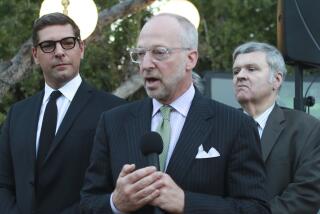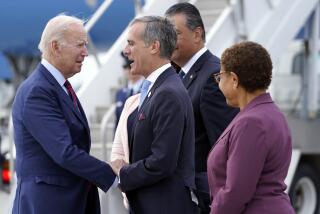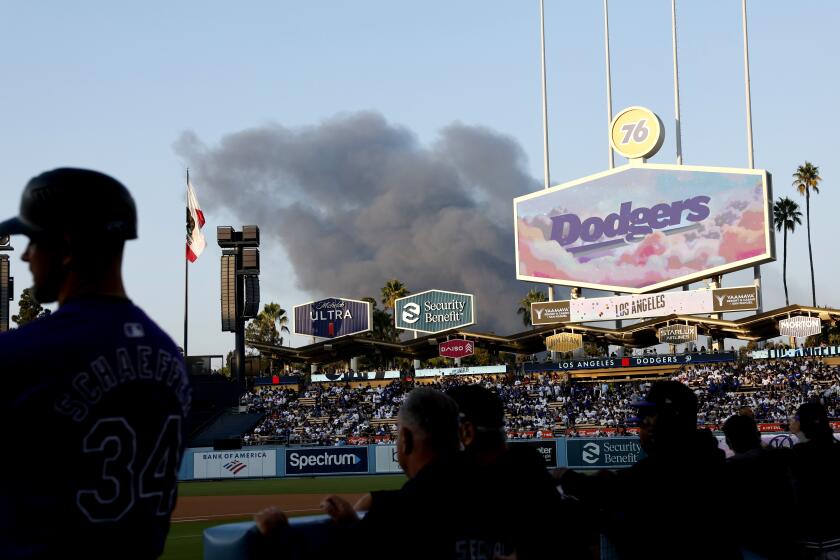Garcetti has a side commitment: the U.S. Naval Reserve
If he manages to get elected, Eric Garcetti may be the first mayor of Los Angeles who slips away for a little clandestine activity at a secret locale — and doesn’t mind if his constituents find out about it.
The city councilman and mayoral candidate’s eight-year commitment to the U.S. Naval Reserve’s intelligence service runs through the end of the year. He would like to extend it beyond that, if possible.
Garcetti, who faces City Controller Wendy Greuel in a May 21 runoff, has focused only fleetingly on his military service since the start of the mayor’s race last year. That may change, however, as the three-term city lawmaker tries to show voters that he’s more than just another bleeding heart on the city’s liberal-leaning council.
FULL COVERAGE: L.A.’s race for mayor
“He may have been holding this part of his biography in reserve a bit during the first round,” said Jack Pitney, a government professor at Claremont McKenna College. “He was trying to consolidate the liberal base. He may think it’s a much more effective appeal in the runoff, when he is trying to peel off some conservative voters.”
Voters might wonder how Lt. Garcetti could handle roughly 40 days a year of training and exercises with the Navy while holding down a demanding office. But the time crunch didn’t become much of an issue during his time on the council, even for the six years when he served in the demanding role of president.
More vexing might be how Garcetti’s political attire, accessorized with hunger strikes for immigrant rights, protests against sexual violence and sponsorship of a council resolution against the war in Iraq, can be retailored into a naval uniform, complete with an Information Dominance Warfare officer’s pin.
L.A. ELECTIONS 2013: Sign up for our email newsletter
Garcetti, 42, said his eclectic resume is not as incongruous as it might seem.
He believes his disparate interests are all tied together by the notion of public service, a concept he said he embraced early, in part because of his paternal grandfather’s service in the U.S. Army during World War II. Salvador Garcetti was a Mexican immigrant and a bit of a wrong-way kid until his service straightened him out and helped him earn his citizenship, his grandson said.
Another encounter during his college years — when Garcetti traveled from Columbia University to Burma to work with democracy activists — reignited the call to service. A former U.S. Army colonel, Bob Helvey, taught the rebels tactics in nonviolent resistance.
Helvey recalled that Garcetti showed both an interest in the humanitarian work and had already begun to consider a possible run for political office. Some saw his academic training — including a master’s degree from Columbia’s School of International and Public Affairs — as natural preparation for a spot in Congress.
“I told him it would be mighty nice to have a little bit of experience in the military” to round out his world view, Helvey said. “I suggested military intelligence because he has a good mind and it’s not a dirty job and you have a better chance of staying alive.”
Garcetti said he felt too many Democrats had shied away from the military after the Vietnam War. He believed many in his generation had made few sacrifices for the world around them.
Even as he pushed for the 2003 city resolution condemning the U.S. invasion of Iraq, Garcetti was careful to praise the military. He testified to “our unquestionable pride in and support for the men and women of the armed services.”
In 2005, he signed on as an ensign in the Navy Reserve.
“For me there was a decision, would I ... regret it for the rest of my life if I didn’t serve, especially in the time after 9/11 and especially given my own family’s experience?” he said. “It’s always been a strong value.”
The reserve requires one weekend of “drilling”— instruction and training across a range of disciplines — per month and two weeks a year of more intensive training. Despite a frenetic schedule, Garcetti has managed to complete those requirements.
In one particularly hectic stretch, in May of 2009, Garcetti had to work a graveyard shift for an extended Navy exercise in Rhode Island, then fly back to L.A. to help stave off a hiring freeze in the Los Angeles Police Department. Once he had voted, he immediately flew east again for another overnight shift at his Navy post.
His public Navy record shows no blemishes. Garcetti earned a marksman’s ribbon with a 9-millimeter pistol and the Navy Marine Corps Achievement Medal for increasing “mobilization readiness and the unit’s ability to support the fleet.”
Unlike some politicians and others, who request a special status so that they will not be deployed overseas, Garcetti has been eligible for deployment to Iraq, Afghanistan or other hot spots, according to Navy Reserve officials. In recent years, many spots have been filled by reservists who volunteered because they could not find work on the home front.
“He could get tagged, his number just has not come up,” said Capt. James Markloff, Garcetti’s onetime commander and also a retired lieutenant in the Los Angeles Police Department.
Asked if he would feel as though he missed something if he didn’t serve in a war zone, Garcetti said: “If that day ever comes up, now or in the future, I certainly would be prepared to go. But ... any romanticism people have should be tempered with concern for family, for the separation and time away and just the tough plugging of any work you do when you are deployed.”
Markloff called Garcetti “the real deal,” a young officer with a sense of duty, who stood out even among an outstanding group that Markloff helped train. “I would put Garcetti as leader of 10 young officers I had,” Markloff said. “He was kind of the standout.”
Garcetti and his commanders decline to be more specific when asked about his duties, saying his assignments under a classified security clearance can’t be made public. At one time he served at Point Loma in San Diego, assigned to the commander of the Pacific Fleet.
More recently, he has been assigned to a unit in the Los Angeles/Long Beach port area. The proximity allows him to train during the day and return to spend nights with his wife and young daughter at the family’s Silver Lake home.
“It’s been one of the best things I have done for all sorts of reasons,” Garcetti said of his military commitment. “Being in the midst of [serving in political] office, it was always a good check on your ego and a good check on how you would do in a different organizational structure.”
Maybe there is something about spy work and Los Angeles politics. Fletcher Bowron, mayor from 1938 to 1953, served in World War I in artillery and Army intelligence. Mayor Sam Yorty, who left office in 1973, was a captain in the intelligence branch of the U.S. Army Air Forces during World War II.
During the mayoral campaign, Garcetti has deferred several weekend training sessions. After the May runoff, he plans on spending a good part of June making up the missed commitments.
When he highlights his Navy service, the candidate can expect a hand from a Republican: Assemblyman Jeff Gorell of Camarillo, a fellow reservist who has served with Garcetti and said he sees him as a bright and capable leader.
Garcetti has several options to extend his military duty, including the Individual Ready Reserve, which requires less training.
“I think all of us who have done this feel it’s tough to walk away from,” Garcetti said.
More to Read
Sign up for Essential California
The most important California stories and recommendations in your inbox every morning.
You may occasionally receive promotional content from the Los Angeles Times.












